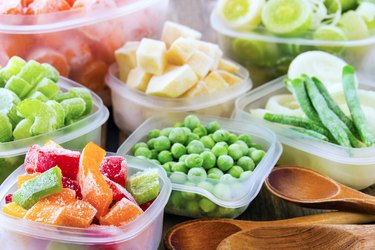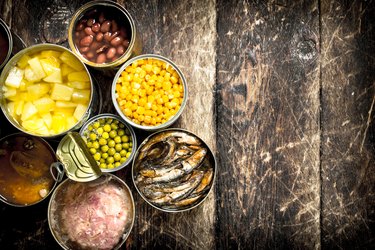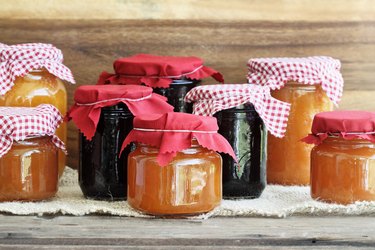
Fresh is best… or at least that's what we're often led to believe. But the truth is, healthy foods are also found in cans, jars and in packages in the freezer aisle.
Fruits and veggies are two of the most common food groups we find in the fresh, canned and jarred foods sections. And we should be eating at least nine servings of fruits and veggies daily but we're only getting 3.5 servings on average, per a May 2013 study in Advances in Nutrition.
Video of the Day
Video of the Day
One of many reasons for our low produce intake is that we perceive "processed" produce — like frozen, canned and jarred — less healthy than their fresh counterparts.
An August 2018 study in Appetite confrims that despite the convenience and health benefits of frozen foods, we still don't eat enough of them because of those negative, ingrained associations. This is troubling because there's no basis for this line of thinking.
Researchers of a June 2017 study in the Journal of Food Composition and Analysis spent two years analyzing specific nutrients in fresh and frozen broccoli, cauliflower, corn, green beans, green peas, spinach, blueberries and strawberries.
They found that in the majority of cases, there were no significant differences in nutrient values across fresh or frozen. And, when differences did exist, frozen foods outperformed because fresh, refrigerated produce can actually lose vitamins over time.
Other healthy foods we commonly find in the frozen, canned or jarred foods section are whole grains, beans and lean proteins like tuna. We need to be eating more of these, too, as reported by the 2015-2020 Dietary Guidelines for Americans.
Long story short: Expand your horizons when it comes to the way you buy your food. Embrace the convenience and affordability of frozen, canned and jarred varieties — just avoid making these shopping mistakes.
Mistakes to Avoid When Buying Frozen Foods

Among those who eat frozen fruits and vegetables, overall intake of these two food groups is higher compared to those who forgo the frozen route, a February 2018 study in Nutrition found.
The frozen group also had higher intakes of calcium, fiber, potassium and vitamin D, along with lower sodium intakes.
Here are some common shopping mistakes to avoid when buying frozen foods.
1. You Don't Nix the Sauce
Some frozen vegetables and fish come already blanketed in a sauce, and often times, these sauces are high in salt, saturated fat and even sugar in some cases.
Eating too much salt, saturated fat and sugar is linked to metabolic diseases such as high blood pressure, heart disease, diabetes and obesity.
Instead of reaching for the saucey options, look for "naked" sauce-free options and season the food at home with your own healthier dressings, spices and herbs.
2. You Forget to Opt for Unsweetened
Some frozen fruits are available in both sweetened and unsweetened varieties.
Check the packaging and more importantly, the nutrition facts label for any added sugars. Fruit is sweet enough on its own — you don't need the added sugars and syrups.
Tip
Buy frozen foods with recipes in mind. Think about which of your go-to recipes can benefit from frozen foods.
Frozen fruit is great for smoothies and mixing into oatmeal meanwhile vegetables, chicken, fish and whole grains are all great options for soups and casseroles.
Mistakes to Avoid When Buying Canned Foods

People who eat canned goods (more than six cans per week) had higher intakes of 17 essential nutrients, including the shortfall nutrients (nutrients most of us don't eat enough of) potassium, calcium and fiber, a July 2015 study in Nutrients found.
Here are some common shopping mistakes to avoid when buying canned foods.
1. You Don't Look for BPA-Free
Bisphenol A, or BPA, is a chemical found in the thin lining inside of canned goods. The chemical makes its way into the canned food over time, according to the National Institute of Health.
The Food and Drug Administration (FDA) maintains that levels of BPA found in canned foods are not a safety risk, although there is growing research, like this July 2019 paper published in the Journal of the Endocrine Society, showing it's linked to obesity and is especially detrimental to infants, children and even growing adolescents.
If you're concerned about canned foods altogether (BPA-free or not), look for jarred varieties.
2. You Forget to Skip Syrups
Canned fruit is often packaged in some type of juice or syrup.
Look for fruits packaged in their own juice and avoid syrup-based options, which are higher in added sugars.
3. You Don't Spend Time Looking for Low-Sodium Options
Soups, vegetables and even canned beans and proteins can be high in sodium. Instead, look for packaging that says "no-added salt" or "low-sodium."
Nixing the amount of sodium in your diet can help reduce your blood pressure and protect your heart health.
4. You Buy Dented Cans
Cans that are heavily dented, which means you can "lay your finger into it," according to the FDA, may mean the can is damaged and bacteria, such as Clostridium botulinum, may have found its way in.
Skip the dented cans in order to avoid food poisoning.
Mistakes to Avoid When Buying Jarred Foods

When buying foods canned in jars, not metal cans, you no longer have to be concerned about finding labels that read "BPA-free."
Glass jars do not have the epoxy lining that metal cans do.
Here are some common shopping mistakes to avoid when buying jarred foods.
1. You Buy Jarred Foods With Syrups
Fruit that is canned in a glass jar is also frequently packaged in a juice or syrup.
Look for fruits packaged in their own juice and avoid syrup-based options to cut down on added sugars.
2. You Don't Look for Low-Sodium Options
Soups and vegetables that have been preserved in a glass jar may be high in sodium. Look for packaging that says "no-added salt" or "low-sodium."
- Advances in Nutrition: "Health-Promoting Components of Fruits and Vegetables in the Diet"
- Appetite: "Negative Associations of Frozen Compared with Fresh Vegetables"
- Journal of Food Composition and Analysis: "Selected Nutrient Analyses of Fresh, Fresh-stored, and Frozen Fruits and Vegetables"
- 2015-2020 Dietary Guidelines for Americans: "Shifts Needed To Align With Healthy Eating Patterns"
- Nutrition: "Total Fruit and Vegetable Consumption Increases Among Consumers of Frozen Fruit and Vegetables"
- Nutrients: "Frequent Canned Food Use is Positively Associated with Nutrient-Dense Food Group Consumption and Higher Nutrient Intakes in US Children and Adults"
- National Institute of Health: "Bisphenol A (BPA)"
- Food and Drug Administration: "Questions & Answers on Bisphenol A (BPA) Use in Food Contact Applications"
- Journal of Endocrine Society: "Urinary Bisphenols and Obesity Prevalence Among U.S. Children and Adolescents"
- Food and Drug Administration: "Shelf-Stable Food Safety"